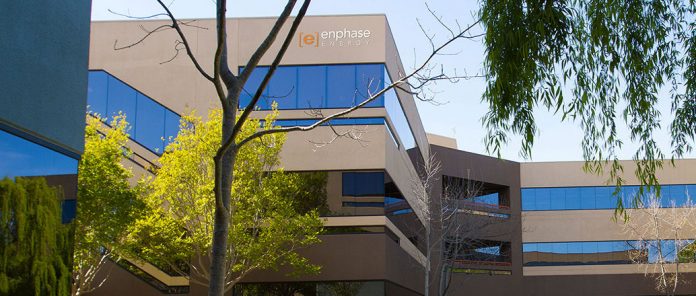Module manufacturer Hanwha Q Cells and micro-inverter manufacturer Enphase have announced a partnership to produce and sell AC modules. Shipping will start in the U.S. market from July 15.
 The Q.Peak Duo BLK-G6+/AC 340-345 ACM features Enphase IQ 7+™ micro-inverters and is the first Enphase Energized ACM from Q Cells to hit the market. The AC module is in the 345 Wp power class and comes in at an efficiency of 19.5%. According to Q Cells, the specs have been achieved thanks to Q.antum Duo monocrystalline half-cell technology and a six-busbar cell design.
The Q.Peak Duo BLK-G6+/AC 340-345 ACM features Enphase IQ 7+™ micro-inverters and is the first Enphase Energized ACM from Q Cells to hit the market. The AC module is in the 345 Wp power class and comes in at an efficiency of 19.5%. According to Q Cells, the specs have been achieved thanks to Q.antum Duo monocrystalline half-cell technology and a six-busbar cell design.
Micro-inverters offer a number of advantages, such as better partial shading management and installation flexibility, because there is no string length to abide by. Usually, installers need to mount a micro-inverter under each module by hand, driving up installation costs and potentially acting as a source of failure.
“This new ACM is certain to be a rock-solid combination,” said Dewaine Dennis Sr., founder and co-owner of Quantum Solar Designs. “This new Q Cells AC module fills an important gap in the mid-market and represents a great way to deliver value to both installers and homeowners.”
Those issues have been addressed adequately, as the companies preassembled the two products in the factory. They say that installers can improve their competitiveness by improving capital management, reducing labor costs, enhancing stock-keeping unit management, and accelerating array design processes, in addition to facilitating faster installation times.
“Q Cells is a global PV technology leader known for its high-quality photovoltaic solar cells and modules, and this AC module partnership is yet another validation of the ACM concept and Enphase’s microinverter technology,” said Badri Kothandaraman, chief executive officer at Enphase Energy. “This ACM partnership harnesses the strengths of both companies to offer a high quality, easy-to-use solution for the high-volume residential market.”
Enphase has previously entered similar partnerships with Longi, Solaria, Panasonic, and SolarWorld. Notably, in the U.S. market, the deployment of module-level power electronicshas been mandated for rooftop deployment, as the National Electric Code demands the installation of a rapid shutdown function at the module level. Such devices improve fire safety because they allow the de-energizing of an array within a few seconds, to make it safe for firefighters to work with water around modules.






